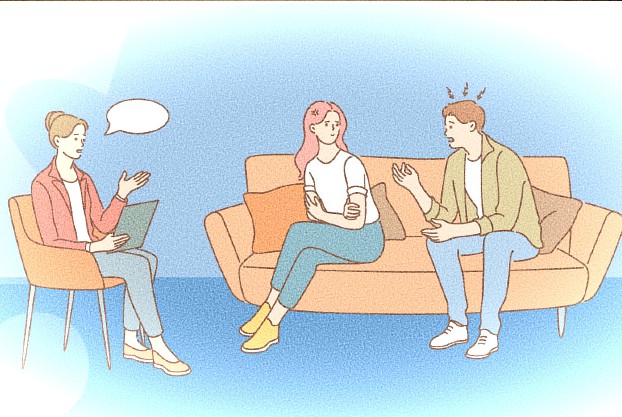In a world where relationships are both cherished and tested, the need for effective tools to navigate the complexities of love has never been greater. Statistics reveal that nearly half of all marriages in some regions end in divorce, underscoring the challenges that couples face in maintaining lasting bonds. However, the journey of love is not limited to the confines of marriage; countless pre-marriage relationships encounter hurdles that can either fortify or fracture their connection. Moreover, queer and transgender couples often confront unique societal pressures and discrimination, adding layers of complexity to their relationships.
Amidst these trials and tribulations, couple therapy emerges as a beacon of hope, offering a guiding light through the darkest storms of love. This transformative practice is not reserved solely for marriages in distress but extends its embrace to couples at every stage of their journey. From pre-marriage counselling that lays the foundation for a strong and enduring partnership to therapy sessions tailored to the specific needs of queer and transgender couples, the benefits of therapy are manifold and profound.
Understanding the Landscape of Love
Before vows are exchanged, couples often grapple with a myriad of issues that can strain their relationship. Incompatibility, communication breakdowns, and differing expectations are just a few of the challenges that can sow seeds of doubt and discord. Pre-marriage counselling provides couples with a safe space to explore these concerns, equipping them with the tools and insights needed to navigate the complexities of partnership with clarity and confidence.
Nurturing Diversity and Inclusivity
For queer and transgender couples, the journey of love is often fraught with additional obstacles stemming from societal prejudice and discrimination. Couple therapy acknowledges and honours the unique experiences of these couples, providing a supportive environment where they can openly address their concerns and strengthen their bond. By embracing diversity and promoting inclusivity, therapy fosters a culture of acceptance and understanding within relationships, paving the way for love to flourish in all its forms.
Relationships can be challenging, and even the strongest couples can face difficulties that seem insurmountable. Therapy for couple counselling provides a structured environment for partners to address and resolve their issues. Here are six reasons why therapy for couples is helpful.
- Improved Communication - Effective communication is the cornerstone of a healthy relationship. Often, couples struggle to express their thoughts and feelings openly and constructively. Therapy provides a safe space for partners to improve their communication skills. Therapists teach techniques such as active listening, non-verbal communication, and how to express emotions without blame, which can lead to a deeper understanding and stronger connection between partners.
- Conflict Resolution - Disagreements and conflicts are a natural part of any relationship. However, unresolved conflicts can lead to resentment and a breakdown in the relationship. Couple therapy helps partners learn how to resolve conflicts in a healthy and constructive manner. By addressing underlying issues and finding common ground, couples can develop strategies to manage disagreements without damaging their bond.
- Rekindling Intimacy - Over time, many couples find that their emotional and physical intimacy wanes. Therapy for couples can help partners reconnect and rekindle their intimacy. Therapists guide couples in exploring their emotional needs, improving physical closeness, and fostering a deeper emotional connection. This can reignite the passion and affection that brought the couple together in the first place.
- Building Trust - Trust is a fundamental aspect of any relationship, and once it’s broken, it can be challenging to rebuild. Therapy for couple counselling provides a supportive environment for partners to address issues of trust, such as infidelity or betrayal. Therapists work with couples to rebuild trust through honesty, transparency, and consistent positive actions. This process can strengthen the relationship and restore a sense of security and reliability.
- Enhancing Emotional Support - Feeling emotionally supported by your partner is crucial for a healthy relationship. Therapy helps partners understand each other’s emotional needs and how to meet them. Therapists teach couples how to offer and receive emotional support, which can enhance the overall emotional well-being of both partners and create a more nurturing and loving relationship.
- Personal Growth - Individual growth within a relationship is vital for long-term happiness. Therapy encourages partners to explore their own personal development while supporting each other’s growth. By understanding and addressing personal issues, individuals can become better partners. This mutual growth fosters a more balanced and fulfilling relationship where both partners can thrive together.
In couple counselling, trained therapists provide a neutral and supportive environment where partners can openly discuss their concerns and feelings. Through guided conversations, exercises, and activities, therapists help couples identify patterns of behavior, underlying issues, and areas for improvement in their relationship. Therapists tailor their approach to the unique needs of each couple, offering personalized guidance and strategies for overcoming challenges. Therapy empowers partners to communicate more effectively, resolve conflicts constructively, and build a stronger, more resilient relationship together.
Couple Counselling is a valuable tool for strengthening relationships and resolving issues that may seem insurmountable. By improving communication, resolving conflicts, rekindling intimacy, building trust, enhancing emotional support, and fostering personal growth, therapy for couple counselling can help partners create a stronger, healthier, and more fulfilling relationship. If you and your partner are facing challenges, consider seeking the support of a professional therapist to guide you on this transformative journey.

